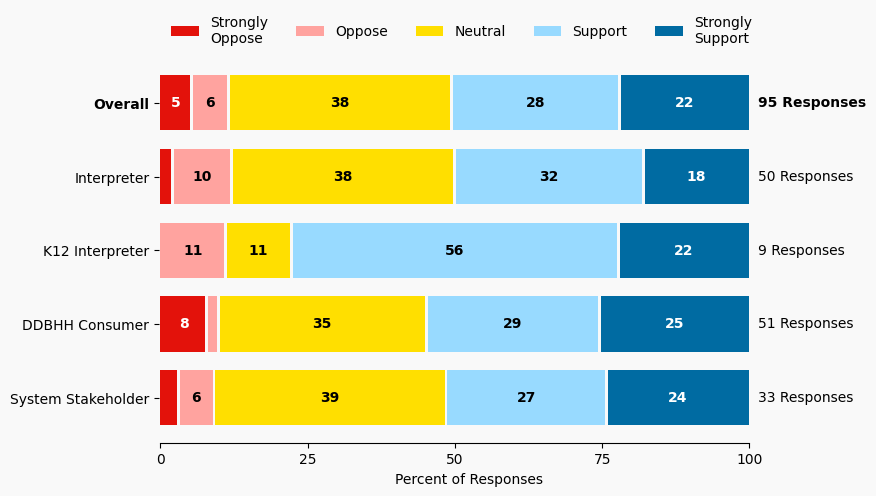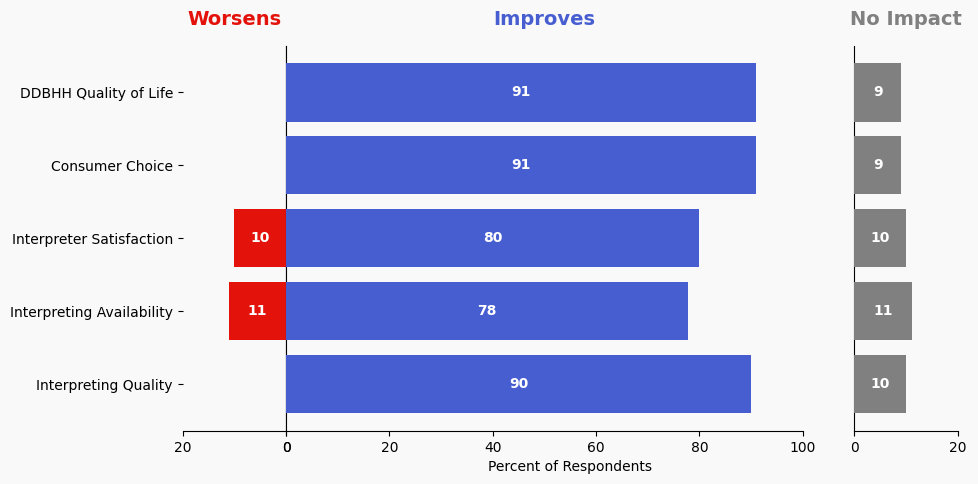71 License K12 Interpreters through the Minnesota Professional Educator Licensing and Standards Board (PELSB)
Issue: School districts operate differently when hiring K12 interpreters, resulting in a lack of standards and quality control.
Proposed Solution: Require a license to provide interpreting services in educational settings in Minnesota. A license would create standards and a system for ensuring hired applicants are meeting minimum standards. Ideally licensing would be a parallel process to licensing teachers, with similar education and credentialing expectations. Establish a licensing committee to determine the rules and the process for licensing. Determine if licensing would be under an interpreting licensing board or under PELSB.
Expected outcome: DDBHH students would receive higher quality interpreting services in their critical years of language and cognitive development; therefore, their quality of life will be improved for the duration of their life through educational, vocational, physical and mental health and overall autonomy. Educational interpreters would experience higher levels of professional expectations, greater job satisfaction and higher rates of compensation. More interpreters would choose to work in K12 educational settings.
Who is impacted: DDBHH K12 students, Deaf and hearing educational interpreters in K12 settings
Update: A suggestion was made to merge this solution with the Roster solution (#69).
Timeline: 6 months
Note: Every educational interpreter who interacted with Interpreting Forward expressed strong positive support for PELSB licensing of K12 educational interpreters.

Summary of Support Image Description
The stacked bar charts show how respondents rated their level of support and the total number of responses. The percentage for the five support levels is shown from left to right: Strongly Oppose (Dark Red), Oppose (Light Red), Neutral (Yellow), Support (Light Blue), and Strongly Support (Dark Blue).
Respondents may identify with multiple subgroups. The overall level of support is:
Overall
Strongly Oppose: 5%
Oppose: 6%
Neutral: 38%
Support: 28%
Strongly Support: 22%
Click to see the detailed image description for each subgroup.
Interpreter
Strongly Oppose: 2%
Oppose: 10%
Neutral: 38%
Support: 32%
Strongly Support: 18%
K12 Interpreter
Strongly Oppose: 0%
Oppose: 11%
Neutral: 11%
Support: 56%
Strongly Support: 22%
DDBHH Consumer
Strongly Oppose: 8%
Oppose: 2%
Neutral: 35%
Support: 28%
Strongly Support: 25%
System Stakeholder
Strongly Oppose: 3%
Oppose: 6%
Neutral: 39%
Support: 27%
Strongly Support: 24%
Overview of Respondents Opting for In-Depth Solution Analysis
After indicating their support level, 6% of the 95 respondents opted in to further assess whether the solution would worsen or improve on five metrics. Of the opt-in reviewers (6 respondents), 66% supported the solution, 16% were neutral on the solution, and 16% opposed the solution.
The remaining 89 respondents did not opt in to further assess the solution. Of these people, 49% support the solution, 39% were neutral on the solution, and 11% opposed the solution.
Reviewer Evaluation of Solution Effectiveness

Solution Effectiveness Image Description
The stacked bar charts show how respondents assessed the effectiveness of this solution based on five metrics. For each metric, the percentage of respondents is shown from left to right: Worsens (Red), Improves (Blue), No Impact (Gray).
DDBHH Quality of Life
Makes It Worse 0%
Makes It Better 90%
No Impact 9%
Interpreter Satisfaction
Makes It Worse 10%
Makes It Better 80%
No Impact 10%
Consumer Choice
Makes It Worse 0%
Makes It Better 90%
No Impact 9%
Interpreting Availability
Makes It Worse 11%
Makes It Better 77%
No Impact 11%
Interpreting Quality
Makes It Worse 0%
Makes It Better 90%
No Impact 10%
Reviewer Feedback and Insights
Interpreter
Comments from Interpreters express mixed opinions, with one comment noting that moving within PELSB would elevate the status of interpreters within K-12 settings and create a more standardized professional environment. One comment supports licensure, citing that interpreters should be licensed like other professionals to establish respect among educators. Another comment raises concerns around potential barriers created by multiple layers of certification and licensure requirements.
Deaf, DeafBlind, Hard of Hearing
No comments were submitted.
System Stakeholder
No comments were submitted.
PREVIOUS SOLUTION
70 MDE Promote NTID Course for Provisionally Licensed K12 Interpreters
Issue: Provisionally licensed K12 interpreters need resources for flexible professional development.
NEXT SOLUTION
72 Prevent Repetitive Motion Injury and Burnout by Hiring Team Interpreters in K12 Settings
Issue: K12 educational interpreters are not regularly provided team interpreters, thus leading to burnout and repetitive motion injuries.
Leave a Reply